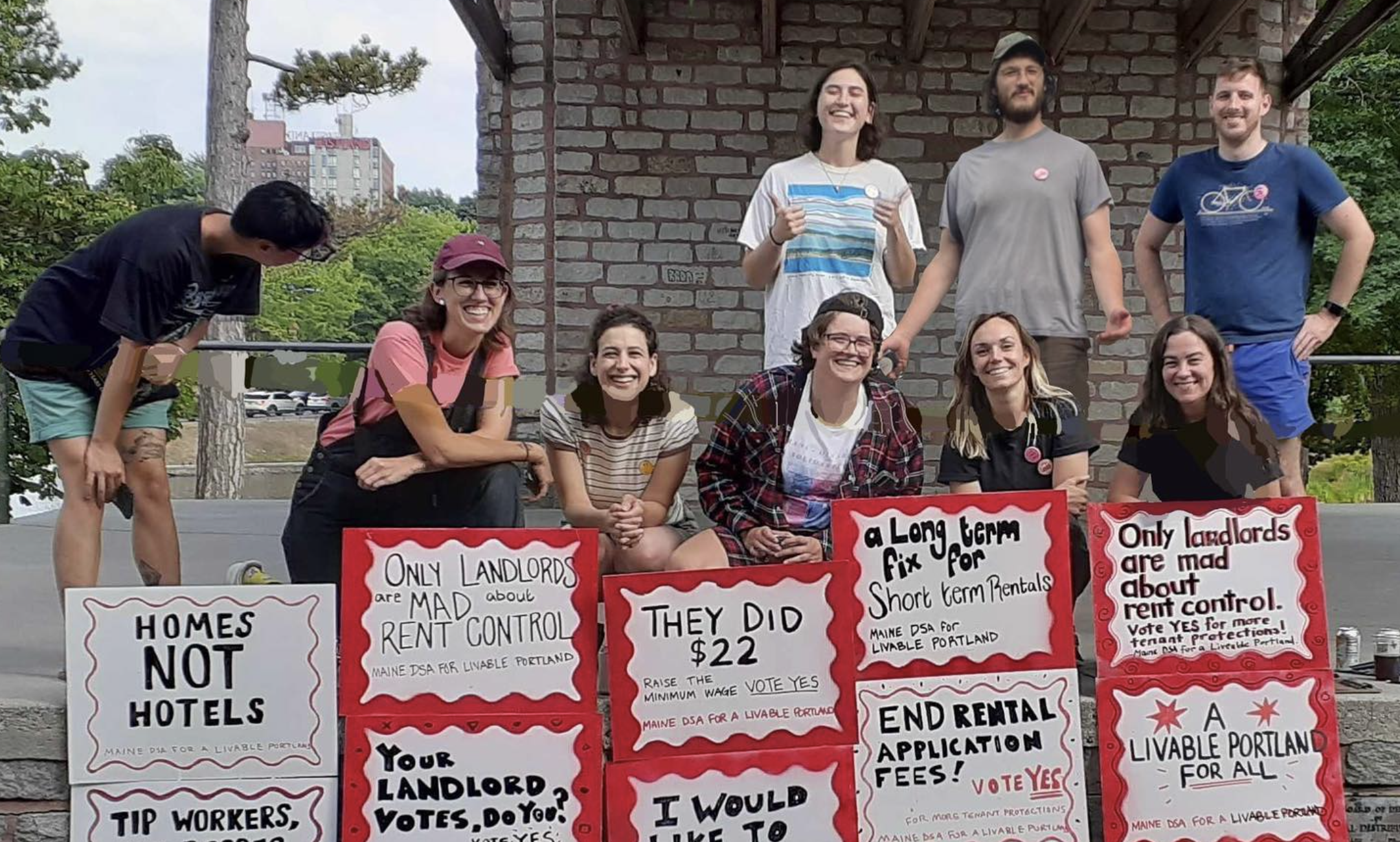This November, Portland, Maine will get the chance to vote on an ambitious economic agenda, including ballot initiatives that would raise the minimum wage, eliminate the sub-minimum wage for service workers, and enact a range of tenant protections. The Maine chapter of the Democratic Socialists of America helped get most of the referendum questions on the ballot this cycle as part of their campaign for a “Livable Portland.”
The campaign’s first referendum would raise the minimum wage for every worker in Portland to $18 an hour and eliminate the sub-minimum wage for service workers. (Service workers would still get to keep whatever tips they receive on top of this higher wage.) The measure would raise the minimum wage to $18 by January 1, 2025 and starting January 1, 2026, the minimum wage would increase to keep up with inflation as measured by the Consumer Price Index for All Urban Consumers for the Northeast Region. The minimum wage ballot question would also establish a city-run Department of Labor to ensure employers follow wage and worker safety laws. The proposals are building on some of the gains that Maine DSA’s People First Portland campaign made in 2020, when they won a minimum wage increase and rent control in the city.
Another one of the initiatives, Question C, would strengthen tenant protections, requiring landlords to provide tenants 90-days notice before terminating a lease or increasing rent. To try to discourage no-cause evictions, the measure would limit rent increases to 5 percent for voluntary turnovers. The initiative also seeks to reduce costs for tenants by restricting deposits to one month’s rent, banning application fees and imposing additional restrictions. The third ballot initiative would reduce the number of short term rentals in Portland, cracking down on Airbnb and similar platforms that have aggravated the housing crisis.
“We found this model works because it’s so hard to be an elected official. You’re paid basically nothing and you have to work a lot, and if you do anything slightly progressive people will come for you,” Wes Pelletier, chair of the Maine DSA Campaign for Livable Portland, told More Perfect Union. “A lot of the invested, entrenched capital in Portland, they have a lot of time on their hands and they have a lot of resources to spend to protect the status quo. So it’s very difficult to find people who are willing to subject themselves to that and also have the resources to do so.”
A coalition of conservatives and corporate interests, led by the Portland Chamber of Commerce, has launched a campaign to fight the progressive slate of referendum questions. One group, known as “Enough Is Enough,” was created to oppose all 14 referendum questions, and falsely claims that Maine DSA is “attempting to trick voters by using the term sub-minimum wage rather than the widely known term tip credit.” Enough Is Enough, and some prominent business owners in the city, are outright lying about the initiatives. “The truth is that no workers in Portland or the State of Maine make a ‘sub-minimum wage,’” the group says on its website. “No such thing actually exists.”
Mary Allen Lindemann, owner of Portland’s Coffee By Design, recently spoke out against the effort to increase the minimum wage at a Portland Chamber of Commerce event, saying that her business survived the AIDS epidemic, the 9/11 attacks, and many recessions, but she’s now “scared of something that I never thought I would be” and “that’s the referendums.” Enough Is Enough ran an ad last week that featured a clip of Lindemann’s comments but took it down a few days later, according to Facebook’s ad library.
Jo Ophardt, a Maine DSA member working on the Livable Portland campaign, said that eliminating the sub minimum wage would go far in empowering service workers across the city. “It is an industry that gives the workers so little power because they have to rely on tips to make a wage,” Ophardt said. “It pits workers against each other in their own restaurants and it creates a culture of wanting to be as overworked as possible.”
“I know from personal experience, we would have the worst, most understaffed, busiest, most emotionally draining night,” they added. “And I would tell my coworker the next day and they would say, ‘oh, you probably made a lot of money though, I’m jealous.’ So you want it to be the worst night of your life to be able to make money.”
Besides the citizen-initiated referendums, Portland will also consider a series of ballot measures from the Portland Charter Commission. One of those initiatives, called Clean Elections, would create a public financing campaign program for candidates running for municipal office in Portland. The program is similar to the one already offered to all candidates for state office. Fair Elections Portland, the campaign pushing the measure, says the initiative would “put power back in the hands of the people” and empower public servants to represent the people, instead of “wealthy special interests.”
Correction: A previous version of this article misgendered Jo Ophardt, who uses they/them pronouns.



